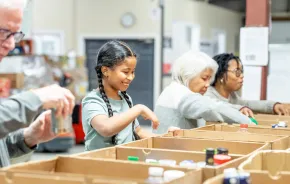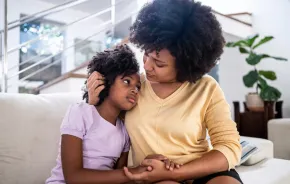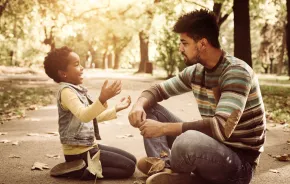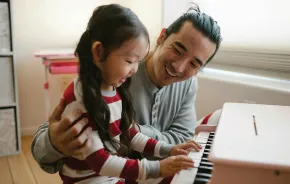
The first time I heard the word “gay,” I was 7 years old. My grandparents and I were watching the evening news in their musty living room. A story came on where two men were shown kissing or holding hands, something I recognized as romantic even at that age. The newscaster kept calling them “gay,” a term I was unfamiliar with as a Catholic schoolboy in 1988.
Turning to my grandmother, crocheting in her knobby wooden rocker, I asked, “What does ‘gay’ mean?”
Unsure what to say, she stared down softly to where I sat cross-legged on the pilled carpet. After a short pause, she said pensively, “It’s when two men kiss.” Then she set her ball of yarn and needle down on her lap, steeling herself for more questions.
My grandmother was a devout Catholic, a woman who collected prayer cards, lit candles to the Virgin Mary and never missed a Sunday mass until her frail body made it too difficult to leave the house. To her, being gay was a sin, but not one she seemed to care much about.
Before I could ask anything else, my grandfather, towering above me in his own cushier rocker, interrupted.
“They’re faggots,” he said in the gruff tone he used when he considered a conversation over. “And you aren’t one of them.”
“Now, Jay ... ” my grandmother started, giving my grandfather a look. He returned it with enough force that she got up and headed into the kitchen to check on dinner. I didn’t dare ask more questions.
* * *
“If you’re gay, it’s OK,” my mother said, sitting across from me on my lumpy twin bed. It was the summer before my freshman year of high school, a time when she thought I should’ve been out chasing girls, not inside playing Super Mario Kart, slumped in a bean bag too close to my rabbit-eared TV.
At first, I was silent. I was too embarrassed to tell my mother that I’d had a crush on a girl, Marghi Irving, for the last two years of middle school.
Only a few weeks earlier, at eighth-grade prom, I’d asked Margie to sign page seven of my signature book — the page middle-school lore dictated was reserved for the classmate you loved. I’d wanted to ask her to dance, too, but I was so nervous that sweat stains formed crop circles around my armpits. I never had a chance with Marghi because she was one of the popular girls, and I was the kid nicknamed Chunk by my classmates.
But those just weren’t things a 13-year-old boy said to his mother. If I’d had a father, I would’ve talked to him about it.
Instead, I stared down at the scuff marks on the hardwood floor left by my G.I. Joe tanks and my baseball cleats, hoping she would drop the conversation. It became apparent I’d have to say something when she leaned in closely, her thin hand patting my skinned-up knee, and said, “Really, Brian. It’s OK.”
“Ma, I’m not gay,” I blurted out finally before showing her my signature book, as if that proved something.
* * *
“What would you do if Sonny were gay?” Michelle asked me one morning a few weeks ago. We hadn’t been dating for long, but we’d quickly developed an honesty and openness not expected of new couples, who are usually so concerned with impressing each other that they don’t talk about things like farting, therapists or raising toddlers.
It hadn’t occurred to me to think about what I’d do if my son were gay. Ever since my ex was pregnant, I’d imagined all the moments I’d have with Sonny that I missed sharing with my own father. Playing catch. Learning to shave. Talking about girls.
But the reality was that Sonny certainly could be gay. If so, would I offer him my mother’s gentle acceptance? Or my grandfather’s hateful intolerance? The short answer — what I said immediately to Michelle — was, “I’d love him no matter what.” Yet there was much more to it.
I wanted so desperately to fit in during my own childhood, but because I was fat, smart and fatherless, I didn’t. When the cool kids spurned me, I thought there was something wrong with me, a part deep inside that needed to be cut out. What I didn’t have then was a strong sense of self, a belief that I should be proud of who I was, regardless of what other people thought.
If Sonny grows up to be gay or fat or any other characteristic that doesn’t adhere to what’s considered “the norm,” then the least I can give him is my love. It’s also my job as his father to teach him how to love himself, to find happiness from within rather than from others.
No one taught me that. I’m still learning today, but it’ll be different for Sonny. He’ll know what I didn’t know much sooner than I realized what was missing.











